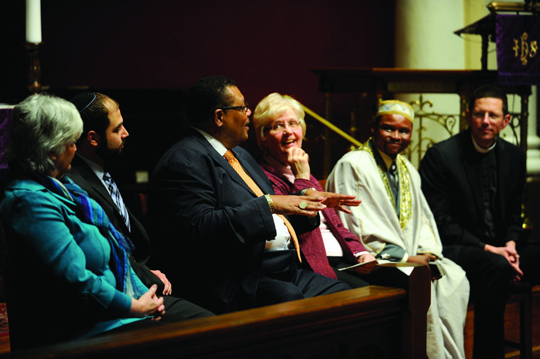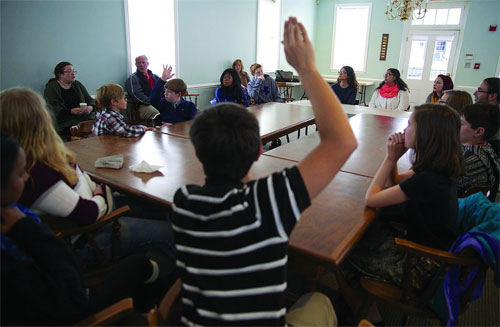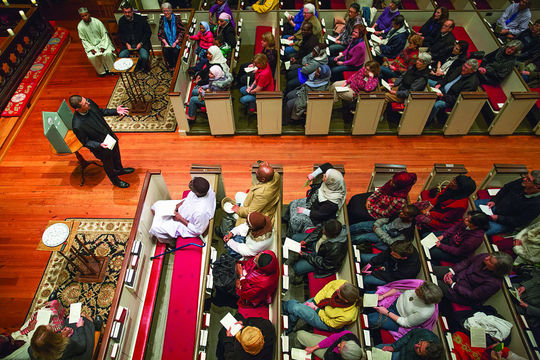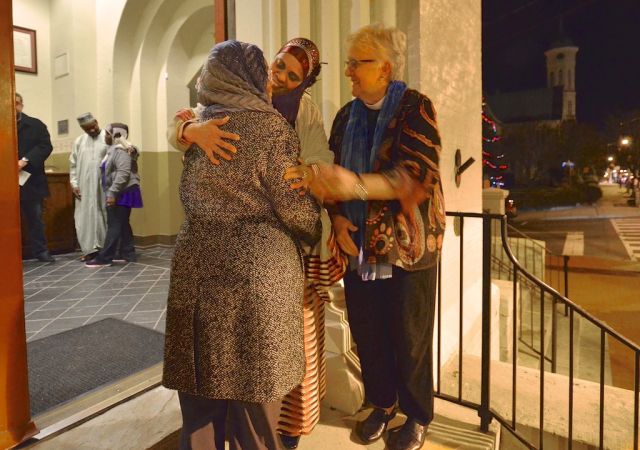The Archdiocese of Chicago‘s Office for Ecumenical and Interreligious Affairs defines “the difference between ecumenical, interfaith, and interreligious relations,” as follows:
- “ecumenical” as “relations and prayer with other Christians,”
- “interfaith” as “relations with members of the ‘Abrahamic faiths’(Jewish and Muslim traditions),” and
- “interreligious” as “relations with other religions, such as Hinduism and Buddhism.”
Here, we are looking at the second one, interfaith.
St. George’s interfaith movement was propelled by Rev. Gay Rahn who came to St. George’s in 2005 and developed numerous interfaith contacts both with the larger community in Fredericksburg and in Northern VA.
Muslim studies were presented through Christian education. In Sept., 2007, Mehdi Aminrazavi, professor of philosophy and religion at the University of Mary Washington, held two-part discussion of the Islamic faith and Muslim-Christian dialogue.
In 2014, the Early Bird class used “The Jesus Fatwah: Loving Our (Muslim) Neighbors As Ourselves” From Living the Questions. The following sessions were part of this study.
Session 1: “Islam 101: In Which We Tell You Some of What You Need to Know About Islam.”
Session 2: “Misconceptions about Islam: In Which We Help You Adjust Your Malarky Filter.”
Session 3: “Islam in America: In Which We Introduce You to People Who Love America and Pray Towards Mecca.”
Session 4: “Making Connections, Part 1: In Which Non-Muslims Make A Case.” AND Session 5: “Making Connections, Part 2: In Which Muslims Have Their Say.”
Interfaith activities were prompted by both the Lenten weekend events and also world events that created a need for response as well as the growing anti-Muslim rhetoric.

Maureen Fiedler, creator and host of “Interfaith Voices” on public ratio was the guest speaker in the Feb., 2015 Lenten weekend. On Sunday of that weekend there was a meeting a local faith leaders including Fiedler; the Rev. Dr. Aaron Dobynes, pastor at Shiloh Baptist Church (Old Site); Sheikh Rashid Lamptey, imam and director of the Islamic Center of Fredericksburg; Catherine Maresca, founder and director of The Center for Children and Theology in Washington, D.C.; Rabbi Jeremy Weisblatt of Beth Sholom Temple; and the Rev. Joseph Hensley, rector at St. George’s. Rev. Deacon Ed. Jones moderate the event. The event was covered by the Free Lance-Star.
While the religions have many differences, they spoke to similar beliefs – loving your neighbor as well as a “singular mission of peace and acceptance of all people” as well as a mission of combating discrimination of anti-Islam and anti-semitic beliefts and actions. They talked about working at common activities, such as “helping the poor, and reaching out to people in everyday situations who are of a different religion.”
The interfaith movement with particularly the Muslims was significant later in the year between Nov., 2015 and Nov. 2016 and grew out of world events:
- The November 2015 Paris attacks were a series of coordinated terrorist attacks that occurred on Friday November 13, 2015 in Paris, France and the city’s northern suburb, Saint-Denis.The Islamic State of Iraq and the Levant (ISIL) claimed responsibility for the attacks saying that it was retaliation for the French airstrikes on ISIL targets in Syria and Iraq
- On December 2, 2015, 14 people were killed and 22 were seriously injured in a terrorist attack at the Inland Regional Center in San Bernardino, California, which consisted of a mass shooting and an attempted bombing. The perpetrators, Syed Rizwan Farook and Tashfeen Malik, a married couple living in the city of Redlands, targeted a San Bernardino County Department of Public Health training event and Christmas party, of about 80 employees, in a rented banquet room.According to FBI Director James B. Comey, the FBI’s investigation revealed that the perpetrators were “homegrown violent extremists” inspired by foreign terrorist groups. They were not directed by such groups and were not part of any terrorist cell or network.
The New York Times would report on hate crimes against US Muslims that were a byproduct of these attacks.
Locally, an unrelated issue spurred verbal attacks against the Muslim Community in Nov., 2015.
The Muslim community had outgrown the 27-year-old Islamic Center of Fredericksburg. When they tried to present their expansionist plans for a new Mosque to to the Spotsylvania Board of Supervisors, on Nov. 17, 2015, only 4 days after the Paris bombings, the Nov. 17 meeting was broken up by a Spotsylvania deputy. The Islamic speaker’s speech was interrupted. “I’m going to do everything in my power to make sure that this [the new mosque] does not happen,” shouted one man. “You can say whatever you want, but every Muslim is a terrorist.” In addition, fliers and social media comments warned residents the mosque was going to bring in Syrian refugees. This was followed by an outpouring of anti-Muslim sentiment on social media.
The Vestry reacted with its own statement of the Fredericksburg Muslim community:
The following statement from the vestry and clergy of St. George’s Episcopal Church, Fredericksburg, Va., has been released in support of local Muslim neighbors who are facing prejudice and opposition as they practice their faith in peace and neighborly love. It is in response to the forum this week in which these neighbors (who have been worshiping in the area for 27 years) were insulted and verbally attacked as they were attempting to have a public dialogue about their plans to build a new mosque. Christ taught us to love our neighbors as ourselves. By making that statement, we bear witness to Christ our King who could see faith even in those who were not of his religion (Matthew 15:28). Our Muslim friends have, on numerous occasions, partnered with us in serving community dinners and participating in interfaith prayer events. That spirit of cooperation bears witness to God’s kingdom where all shall be fed and all shall be free. With Christ as our King, we are empowered to be ambassadors of wholeness in a fractured world. Here is the vestry’s statement:
“In recognition that we are all children of God and that Christians and Muslims share a common faith ancestry, and in recognition that we Christians are called to love God and love our neighbors as ourselves, and in recognition that the Virginia Statute for Religious Freedom was written in our city of Fredericksburg, the vestry and clergy of St. George’s Episcopal Church extend our support to our Muslim friends and neighbors who are practicing their faith within our shared community. We stand for continuing dialogue that can acknowledge our connections as well as our differences and respect the dignity of every human being.”
St. George’s next acted to educate the young on Islam in support of the ministers meeting earlier in Feb.

Two University of Mary Washington students visited a St. George’s youth meeting on a Sunday morning after the Spotsylvania incident. Wazhma Yousafi and Marian Khan spoke about the backlash toward Muslims. Khan pointed out in a Free-Lance Star article that no religion is violent, but that violent people do join faith groups. “If you’re Muslim and you’re violent, you’re going to bring that with you,” she said. “If you’re violent and you’re a Christian, you’re going to bring that with you.”
On Dec. 4, 2015, “An Interfaith Liturgy for Healing and Unity” was held at St George’s in response to the Spotsylvania indicdent.

The bulletin included these words “Tonight’s service brings together elements of two faiths, Christianity and Islam, as a sign of the possibility of togetherness. Other faiths may be represented here, as well. We welcome everyone to join in these prayers as you feel comfortable or to participate with listening hearts. You are also welcome to remain after the service in silent prayer.
The opening prayer was in Arabic by the Fredericksburg Muslim Council. Sura Al-Fatiha (“The Opening”) is the first chapter of the Quran. Its verses are a prayer for God’s guidance and stress the Lordship and Mercy of Allah. This was followed by Luke 1:68-75. Apropos were a series of verses beginning with Luke 1:72 “Thus he has shown the mercy promised to our ancestors, and has remembered his holy covenant, the oath that he swore to our ancestor Abraham,to grant us that we, being rescued from the hands of our enemies, might serve him without fear, in holiness and righteousness before him all our days.”

In Feb., 2016, one of the ideas suggested at the Compassionate Community weekend early in 2016 was that St. George’s find ways to form deeper interfaith relationships.
This has manifested in the following collaborations and education opportunities in 2016. The Lenten Weekend with Natlie Finsted encouraged this development:
- On Saturday, March 12, St. George’s invited them St. George’s for a potluck supper in the hopes that there will be inter-faith gatherings in each other’s homes over the next few months. St. George’s along with other faith communities supported them again anti-Muslim remarks made a meeting in Spotsylvania on Nov. 17 to discuss building an 8,000-square-foot mosque in Spotsylvania.
As Joe Hensley explained, “ It is one way of “patterning our lives after Christ’s radical love as an alternative way of being in the world” (principle #1 of reconciling communities that Natalie shared with us). To take a risk, to open ourselves up to new relationships with people unfamiliar to us is a “shared spiritual discipline that opens us to receiving grace from unexpected resources” (principle #4). “
“Writing almost 40 years ago about interfaith dialogue in a famous book, The Open Secret, Lesslie (yes, it has two ‘s’’) Newbigin said that the reason to enter into these conversations is out of obedience to Jesus. We are not trying to convert others to Christianity, but we are open to a transformation in Christ, because we believe that Christ lives and moves in the lives of all people of every creed and culture. In the encounter with others, we encounter Christ. This is also a way that we are living our baptismal vows. Through fellowship, we are striving for justice and peace and respecting the dignity of every human being.””
“We at St. George’s take this command, this message of God’s love for all men and women in the world as part of our mission to bring the love of God and Jesus to all people. Our church actively supports and takes part in the lives of the Native Americans in Red Shirt Village, South Dakota, communities of Honduras and Haiti, and several communities in Africa, most notably in Juba, South Sudan. We are trying to fulfill the message of Jesus.” Jesus related to Samaritan neighbors, for example, as part of his ministry, even though they were considered by Jews as religious outsiders.
- St. George’s was invited to the Islamic Center on May 14 for another dinner.
- “Journey into America”, Movie Night was held in Oct. 2016, showing the movie in Sydnor Hall. “How do Muslims fit into contemporary American society? Have the American ideals of pluralism, openness, and cultural integration held up in post-9/11 American society?” Muslim professor Akbar Ahmed and his American team travel to over 75 cities and 100 mosques to discover America. They focus on the Muslim community in the United States and give a new perspective on what it means to be “American.”
- Nov. 6. Akbar Ahmed spoke in an afternoon conversation. “Bridges of Peace”
The promotion for the event featured these words – “The question of how we relate to our Muslim neighbors in these times is one that we, as Christians, are called to ask. If we are to love our neighbor as ourselves, then in order to love our neighbor, including our Muslim neighbor, we need to get to know them. Ahmed has been the Chair of Islamic Studies, American University in Washington, D.C”
Gay contributed an article to the book Faithful Neighbors: Christian-Muslim Vision and Practice by Robert S. Heaney and Zeyneb Sayilgan about interfaith work in the community. This came as a result of working with a focus group at Virginia Theological Seminary.
